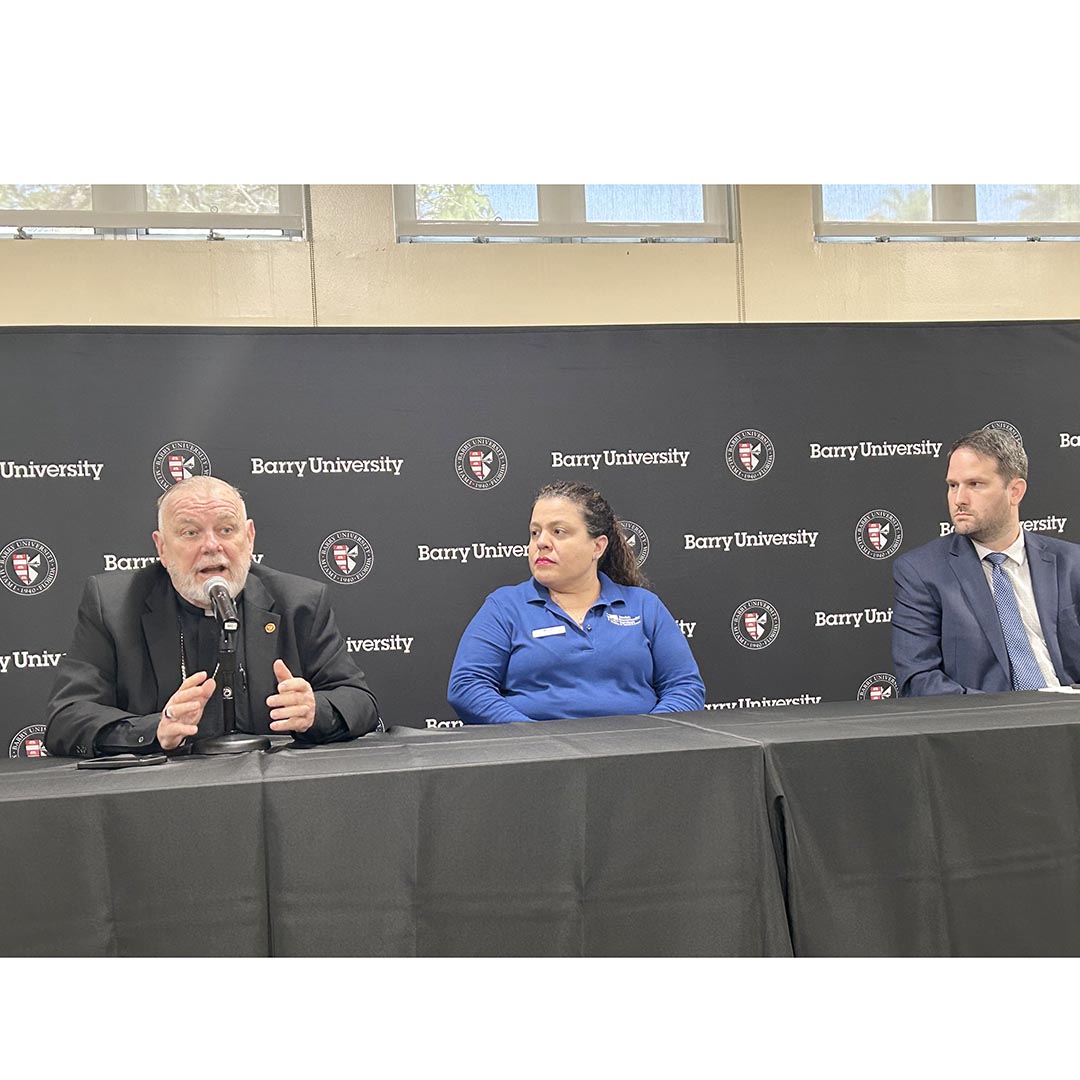By Priscilla Greear - Florida Catholic
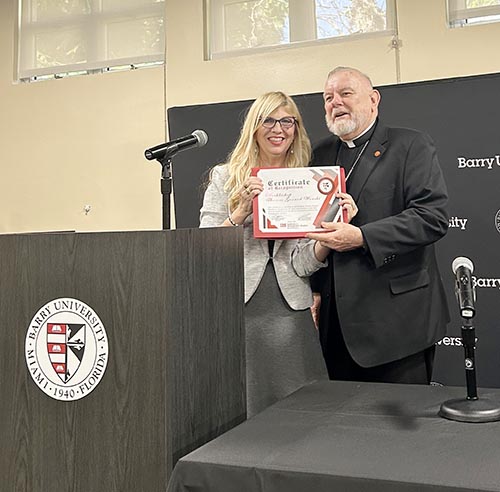
Photographer: PRISCILLA GREEAR | FC
Archbishop Thomas Wenski receives a certificate at the Barry University Institute for Immigration Studies 2nd Annual Conference April 9-10 in Miami Shores from event organizer Giselle Rios, professor of music and the institute's founding director.
MIAMI | When the Mexican border surged in 2023 with migrants from Haiti, Venezuela and Cuba, South Florida welcomed vulnerable newcomers into its communities and provided humanitarian and stabilization services.
Archbishop Thomas Wenski said that while cities like Chicago struggled to accommodate migrants, South Florida responded with compassion, following a tradition since the Cuban influx of the 1960s.
“This South Florida community has received more newcomers percentage wise than any other place in the nation, and there’s been really no pushback here,” said Archbishop Wenski. “We responded the right way as neighbors and recognizing that the migrant might be a stranger but is still a stranger to be embraced as a brother or sister.”
Archbishop Wenski spoke alongside Natalie Herradon of Jewish Community Services of South Florida and Joseph Kano of Catholic Legal Services (CLS) in the opening panel of Barry University Institute for Immigration Studies’ (IIS) second annual conference on immigration, entitled “South Florida: The Hub for Immigration Innovation and Integration.”
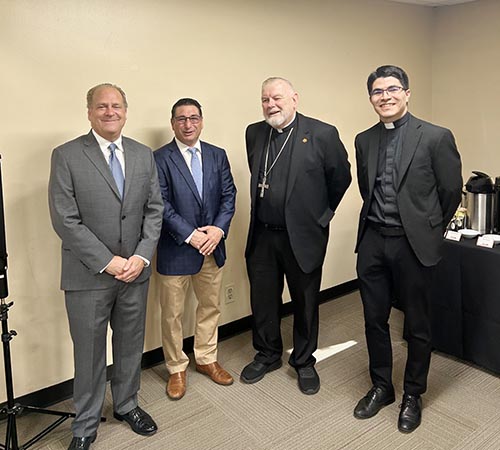
Photographer: PRISCILLA GREEAR | FC
Archbishop Thomas Wenski, second from right, poses, from left, with Steve Litz, an NBC 6 reporter, Sean Foreman, Barry professor of political science, and priest secretary Father Agustin Estrada at the Barry University Institute for Immigration Studies 2nd Annual Conference in Miami Shores. The conference held April 9-10, 2025 explored the theme of “South Florida: The Hub for Immigration Innovation and Integration.”
The conference drew more than 750 students, faculty, and representatives of community organizations from April 9-10, 2025. Talks covered acculturation, art, legal issues, and social services, ranging from Peruvian culinary traditions to Hispanic youth mental health interventions to immigrant detentions. Miami Fusion performed with Kostia Lucky on violin and Armen Martirosyan on piano.
Archbishop Wenski described how the Church has consistently advocated for immigrants’ rights and legal reforms to meet America’s labor shortages. He reflected on how many Cubans struggled to regularize their legal status until the 1966 Cuban Adjustment Act. Then Haitians arrived in the 70s but faced deportations as economic migrants. In 1986, President Ronald Regan signed an amnesty bill that allowed about 3 three million to legalize their status. Afterwards in 1990, Congress created Temporary Protection Status (TPS), protection from deportation to nationals of specifically designated countries who are already in the United States due to conditions in their countries that temporarily prevent them from returning safely. Stressing immigration complexities, he noted that with the recent revocation of TPS for Venezuelans and Haitians (now challenged in court), they shift from semi-legal to illegal status.
Indeed, the U.S. Conference of Catholic Bishops issued a March 2025 report with evangelical partners that over 10 million Christian immigrants are vulnerable to deportation, including those losing temporary protection, and seven million Christian U.S. citizens live with someone at risk.
“We’re not saying there should be open borders, but laws can be better designed to ensure human flourishing, and we do that by advocating for them. At CLS we have about 100 people working seeing about 2,000 people per month,” the archbishop said.“We are trying to not only talk the talk but, thanks to people like them, to walk the walk and make this place better for all of us in South Florida.”
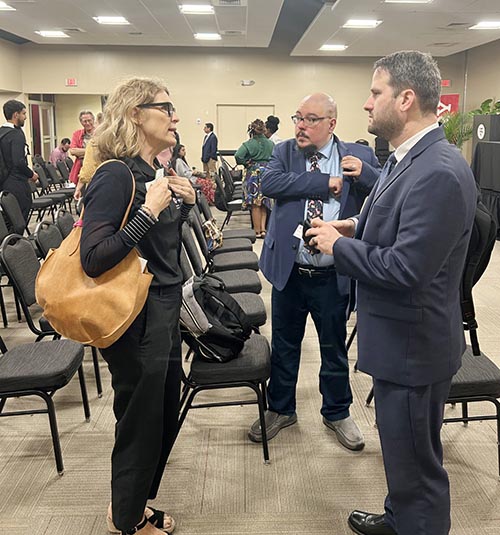
Photographer: PRISCILLA GREEAR | FC
Kim Santomauro, a volunteer with the American Red Cross, networks with Joseph Kano of Catholic Legal Services of Miami at the Barry University Institute for Immigration Studies 2nd Annual Conference held on April 9-10, 2025 in Miami Shores.
Herradon affirmed that in crisis “we come together and support one another regardless of where you’re from” and the Jewish Community Services has served over 1,000 refugees and migrants from Cuban, Afghanistan and Haiti since 2021.
“Behind the broken system lie people, human beings, who have children and families and are just trying to put food on the table, clothes on the kids’ backs and a roof over their heads. Really, that is our day-to-day struggle trying to help our clients,” Herradon said.
Attorney Kano works in Catholic Legal Services’ homeless outreach project. He described the struggle for every noncitizen without permanent residency to get a REAL ID identification, required by May 2025. They must endure a long, difficult process to get a work permit needed for both the REAL ID and eligible public benefits. Additionally, “a lot of our clients… had housing until about 2017 or 2018. They’re now in the local shelters. They simply can’t afford to live anywhere.”

Photographer: PRISCILLA GREEAR | FC
David Lawrence, founding chair of The Children’s Trust and Barry University trustee, speaks on immigration and democratic values at the Barry University Institute for Immigration Studies 2nd Annual Conference on April 9-10, 2025 entitled “South Florida: The Hub for Immigration Innovation and Integration.”
David Lawrence Jr., former publisher of the Miami Herald and founding chairman of The Children’s Trust, urged people to speak up for immigrants’ due process, noting Kilmar Abrego Garcia’s deportation to a Salvadoran prison due to government error. Many immigrant citizens “have made it here frankly due to the goodness and decency of this republic,” said Lawrence, a Catholic and Barry trustee.
Lawrence called people to stand for America’s democracy and highest ideals, just as the Civil Rights Movement was about equal opportunity. With the declining U.S. birthrate, immigration also supports a strong economy. “We need a disciplined process to approve people to be here but we sure as heck need to have good people to be here,” he said. “We need to act as though we are all God’s children… I want you to speak up for what is decent and right and fair and just to continue to make this place better for everyone.”
Immigration lawyer Wilfredo Allen reported a sharp increase in detentions and transfers of detainees between facilities, making it harder to arrange a bond hearing. The number of immigrants detained has increased from 39,000 in late January to 48,000 in early April 2025 with allegations of inhumane conditions. “The panic that’s there is pretty real. It’s a panic when you get a letter telling you that your parole has been revoked and that you have 30 days to leave the country,” said Allen.
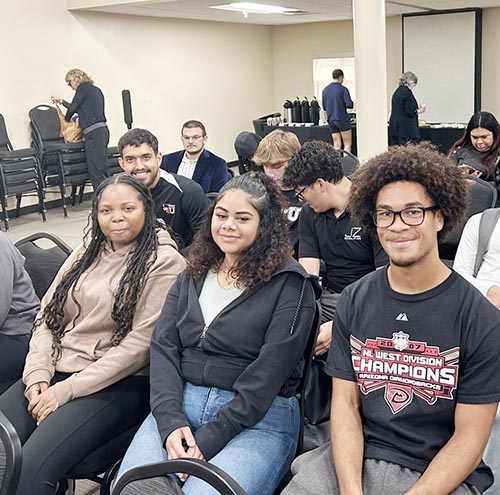
Photographer: PRISCILLA GREEAR | FC
From left, Barry University students Jayden Byard, Nicole Rodriguez Paulino and Mikayla Weddeerburn attend the Barry University Institute for Immigration Studies 2nd Annual Conference on April 9-10, 2025 in Miami Shores.
Allen said that the Supreme Court affirmed the rights of immigrants facing deportation to federal judicial review and advised not “to feed into the panic.” “Prepare and find out ways to challenge (deportations) in court and challenge in applications that can be filed to stay here.”
Shirley Plantin, program director of the Miami-Dade Community Relations Board, described new police department agreements to collaborate with Immigration and Customs Enforcement. “Whenever the fear is as high as it is right now, people are not reporting crimes, particularly domestic violence, child abuse.”
Additionally, undocumented Florida youth now find limited opportunities, as they no longer qualify for in-state college tuition, she said.
Attorney Marlon Hill stressed that immigration laws have not changed in 2025, only expedited proceedings. He advised eligible people to apply for citizenship or permanent residency, seek legal advice and check the ICE and Homeland Security websites. “Are we actually communicating with those leaders who are local and national as to what we want them to do about this?” he said. “Do you provide empathy and compassion to people you don’t know? Are you living your values you profess as part of your faith?”
Barry student Victor Frazzera said his international friends feel concerned after the wave of student visa revocations. He wonders what policies could eventually extend to citizens. “A lot of my friends are international students who don’t know if their visas could be revoked,” he said, adding that his immigrant cousins quickly applied for citizenship this year.
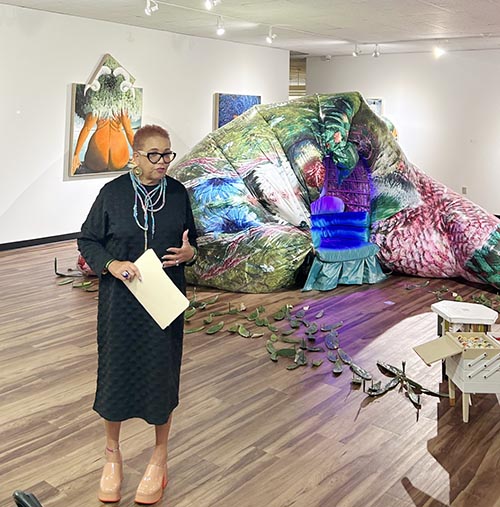
Photographer: PRISCILLA GREEAR | FC
Rosie-Gordon Wallace, president of the Diaspora Vibe Cultural Arts Incubator, speaks about the “The World Is Churning” exhibit of Caribbean and Latin American diaspora art at the Barry University Institute for Immigration Studies 2nd Annual Conference on April 9-10, 2025 in Miami Shores. The conference theme was “South Florida: The Hub for Immigration Innovation and Integration.”
Rosie-Gordon Wallace, president of the Diaspora Vibe Cultural Arts Incubator, curated Barry’s “The World Is Churning” art exhibit. “The highlighting of issues is encouraging. It’s bold for (conference organizer) Dr. Rios to stay focused on the issues of immigrants.”
American Red Cross volunteer Kim Santomauro found the conference informative in her work to connect families with loved ones in detention and refugee camps. “Hearing stories from community leaders who have their fingers on the pulse of today’s ever-changing events reignited my passion to better serve families,” she said.
Archbishop Wenski also praised the educational forum. “That’s what colleges and universities should do, form critical minds so that you can engage with people making the laws or enforcing the laws in a way that creates dialogue.”
Giselle Rios, music professor and IIS founding director, said that “it was apparent during the conference that groups and organizations are working in silos. IIS strives to be the comprehensive hub for the South Florida immigrant experience.”
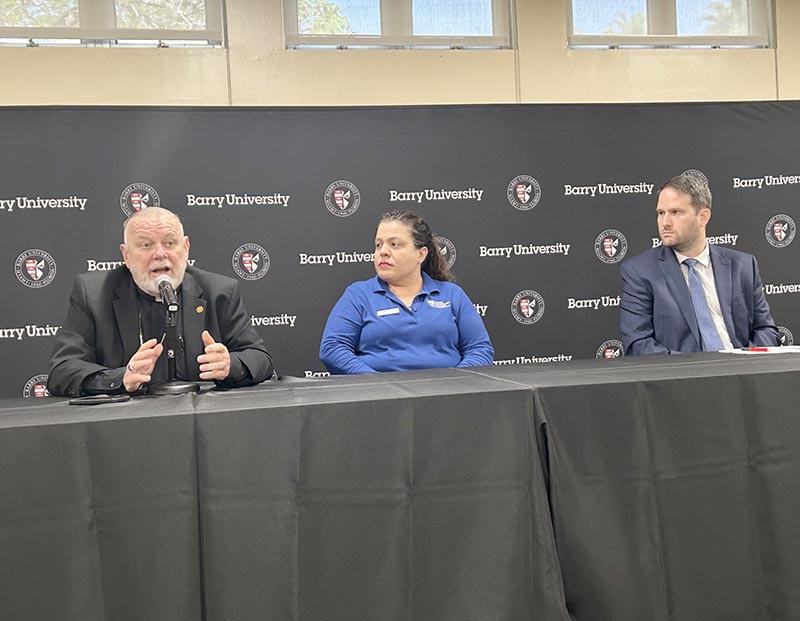
Photographer: PRISCILLA GREEAR | FC
Archbishop Thomas Wenski, left, speaks in a panel moderated by NBC 6 reporter Steve Litz at the Barry University Institute for Immigration Studies 2nd Annual Conference on April 9-10, 2025 in Miami Shores. Natalie Herradon, director of case management services of Jewish Community Services of South Florida, center, and attorney Joseph Kano of Catholic Legal Services also participated in the panel discussion.
